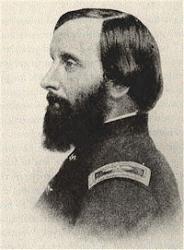- |
User Links
Thomas W. Higginson

www.hymntime.com/tch
| Short Name: | Thomas W. Higginson |
| Full Name: | Higginson, Thomas W., 1823-1911 |
| Birth Year: | 1823 |
| Death Year: | 1911 |
Higginson, Thomas Wentworth, M.A., was born at Cambridge, U.S.A., Dec. 22, 1823, and educated at Harvard. From 1847 to 1850 he was Pastor of an Unitarian Church at Newburyport, and from 1852 to 1858 at Worcester. In 1858 he retired from the Ministry, and devoted himself to literature. During the Rebellion he was colonel of the first negro regiment raised in South Carolina. In addition to being for some time a leading contributor to the Atlantic Monthly, he published Outdoor Papers, 1863; Malbone, 1869; and other works. During his residence at the Harvard Divinity School he contributed the following hymns to Longfellow and Johnson's Book of Hymns, 1846:—
1. No human eyes Thy face may see. God known through love.
2. The land our fathers left to us. American Slavery.
3. The past is dark with sin and shame. Hope.
4. To Thine eternal arms, O God. Lent.
In the Book of Hymns these hymns are all marked with an asterisk. They, together with others by Mr. Higginson, are given in Putnam's Singers and Songs of the Liberal Faith, 1875. [Rev. F. M. Bird, M.A.]
-- John Julian, Dictionary of Hymnology
| Texts by Thomas W. Higginson (13) | As | Authority Languages | Instances |
|---|---|---|---|
| A mute companion at my side | Thomas W. Higginson (Author) | English | 2 |
| An easy thing, O Power divine | Thomas Wentworth Higginson (Author) | English | 2 |
| From street and square, from hill and glen | Thomas W. Higginson (Author) | English | 7 |
| Mid the flower wreathed tombs I stand | Thomas W. Higginson (Author) | 2 | |
| No human eye Thy face may see | Thomas Wentworth Higginson (Author) | English | 20 |
| O gather, gather, stand | Thomas Wentworth Higginson (Author) | English | 2 |
| Safe neath the violets | Thomas Wentworth Higginson (Author) | English | 2 |
| The land our fathers left to us | Thomas W. Higginson (Author) | 3 | |
| The past is dark with sin and shame | Thomas W. Higginson (Author) | English | 23 |
| To Thine eternal arms, O God | Thomas Wentworth Higginson (Author) | English | 35 |
| To veil thy truth by darkening or by hiding | Thomas W. Higginson (Author) | 2 | |
| When first I mark upon my child's clear brow | Thomas Wentworth Higginson (Author) | English | 2 |
| Yes, prayer is strong, and God is good | T. W. Higginson (Author) | 1 |


 My Starred Hymns
My Starred Hymns


